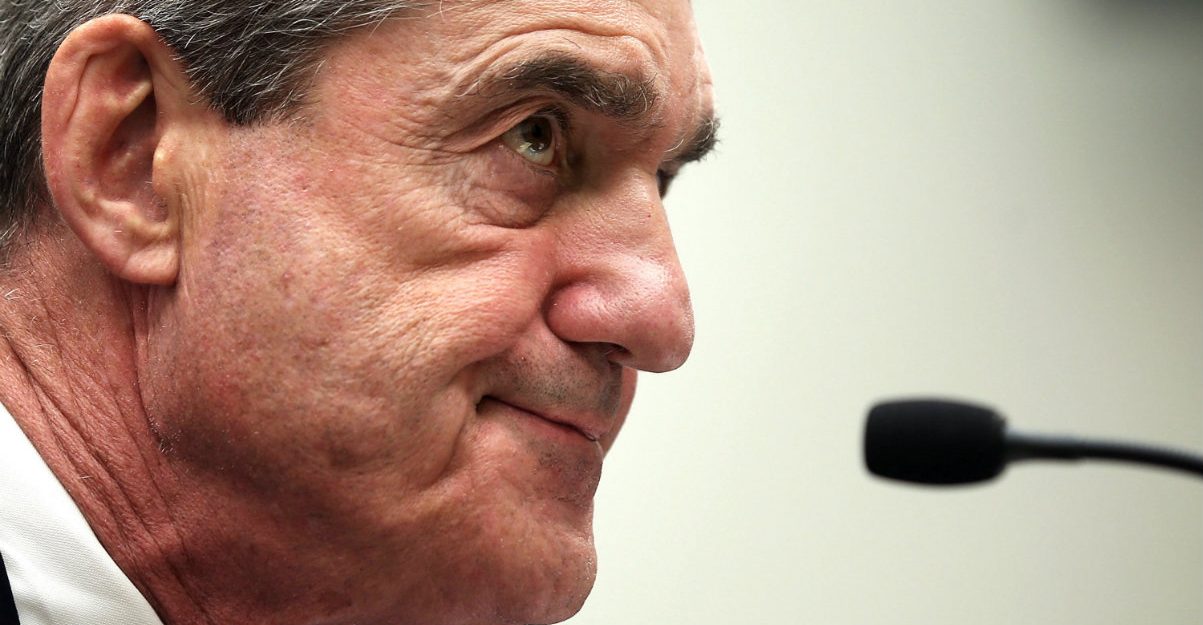
An article published by the New York Review of Books early Friday morning made some waves, and it’s not hard to see why, given the headline “Mueller Prosecutors: Trump Did Obstruct Justice.” Unnamed prosecutors on Special Counsel Robert Mueller‘s team reportedly said that if President Donald Trump wasn’t the President of the United States prosecutors would have considered charges over Trump’s attempt to get former FBI Director James Comey to drop the investigation into fired National Security Advisor Michael Flynn.
Murray Waas, the byline on the story, said that he learned of this from two unidentified federal law enforcement officials who spoke with unnamed prosecutors on Mueller’s team. Per Waas:
Privately, the two prosecutors, who were then employed in the special counsel’s office, told other Justice Department officials that had it not been for the unique nature of the case—the investigation of a sitting president of the United States, and one who tried to use the powers of his office to thwart and even close down the special counsel’s investigation—they would have advocated that he face federal criminal charges. I learned of the conclusions of the two former Mueller prosecutors not by any leak, either from them personally or from the office of special counsel. Rather, the two prosecutors disclosed this information in then-confidential conversations with two other federal law enforcement officials, who subsequently recounted what they were told to me.
This is, of course, newsworthy in itself if these conversations went down exactly as described–and it’s all the more newsworthy when you consider that Mueller himself saw fit to cite an Office of Legal Counsel opinion against indicting a sitting president. Many have viewed Vol. 2 of the Mueller Report as plainly an impeachment referral.
But Waas also opened another can of worms that hasn’t gotten quite as much attention as the overarching claim.
Note that in the story excerpt above the two prosecutors were working on Special Counsel Mueller’s team at the time they made their thoughts about a case against the president known to these unknown people at the Department of Justice. From here, Waas pushed back against the idea that Team Mueller was a completely locked box over the course of the investigation.
“The Mueller investigation itself was so disciplined when it came to leaks that it seemed at times as though the special counsel’s office was hermetically sealed,” Waas writes. This is true. Mueller never said a word publicly while the case was ongoing, and Mueller spokesman Peter Carr really only responded when BuzzFeed incorrectly reported that Trump “directed” Michael Cohen to lie to Congress about the a Moscow Trump Tower (the Moscow Project).
But what about everyone else? Waas said that the “special counsel’s office was […] less sequestered than is generally believed.” Mueller’s prosecutors encountered their peers at the DOJ on a regular basis, often due to criminal investigations Mueller’s team referred out to other offices.
Waas said it was “against this backdrop that prosecutors working for the special counsel spoke to their peers in the Justice Department.” He said it is also how he “learned what, in particular, the two Mueller prosecutors had to say about the Flynn investigation.” On top of this, William Barr‘s handling of the release of the Mueller Report was cited as a reason why people who were wary of breaching their colleagues trust decided to say something they might have otherwise not said:
Two people present during one such conversation provided me with detailed and consistent accounts of what the special counsel’s two prosecutors had said to them. A third person present corroborated that the conversation took place but declined to provide details of what was said.
One person who spoke to me reported grappling with the issue of what could be considered a breach of their colleagues’ confidence. But in part because of what they regarded as Attorney General Barr’s misrepresentations of the Mueller report, they believed it was important for the public and Congress to know what Mueller’s prosecutors had themselves privately concluded: that a charge of obstruction of justice was indeed merited by Trump’s actions in the Flynn matter.
For what it’s worth, all of this seems to match up with reporting we saw from both the New York Times and the Washington Post about members of Mueller’s team being unhappy about Barr’s four-page letter outlining Mueller’s “principle conclusions.”
It was said that unnamed Mueller team members believed Barr “failed to adequately portray the findings of their inquiry and that they were more troubling for President Trump than Mr. Barr indicated,” particularly on obstruction.
As was essentially case with the Waas story, both New York Times and the Washington Post reported that Mueller team members had expressed these thoughts to “associates.” The Times, in particular, reported that “government officials and others familiar with their simmering frustrations” were the source of the story. The Post merely cited people familiar with the matter.
[Image via Alex Wong/Getty Images]